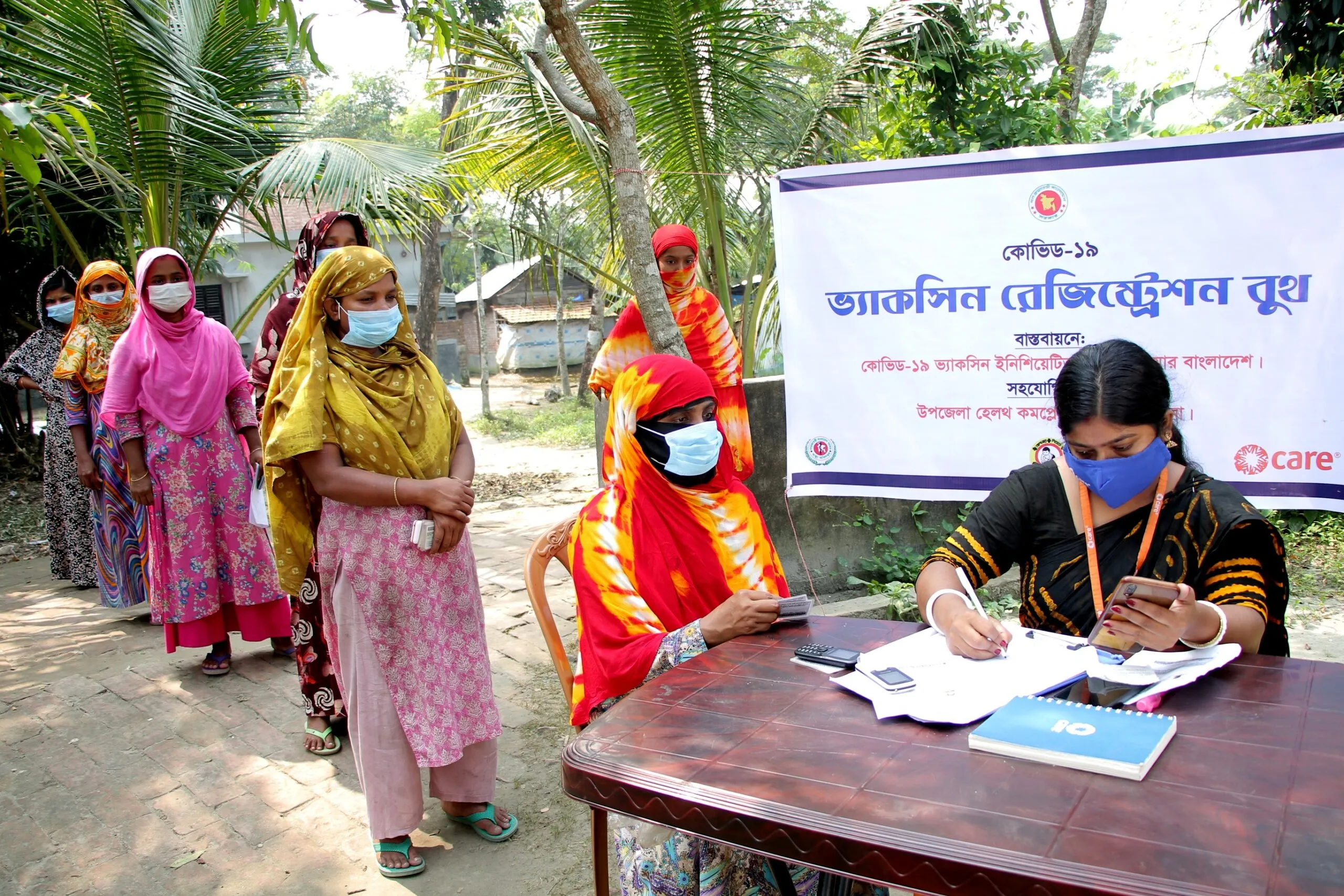The Omicron variant of COVID-19 creating unknown risks around the world sadly proves what we have known for a long time: no one is safe until everyone is safe. Investments in getting vaccines to the last mile for 70% of the global population, and paying the health care workers who do it are the only ways to end the pandemic. CARE’s Fast and Fair initiative does just that, supporting vaccine delivery in 22 countries, and growing to new countries all the time.
Since the initiative started, CARE has worked to promote vaccines, organize vaccine delivery, train health workers, help ensure access for people who need it most, and mobilize people to get the vaccine. By October 2021, CARE has supported vaccines in districts where 126 million people have received vaccines. 263 million people have had access to better information on vaccines through mass media and tailored vaccine messages.
What changed?
- People can register to get vaccines. In Bangladesh, the CARE team worked in the district with the 2nd worst vaccine rate to make it the 2nd best district in the country—with more than 1 million additional people vaccinated. How? By helping people with no internet access register for vaccines and keep appointments. In Ecuador, CARE is working with the Ministry of Health to improve registration and information tracking services. CARE Peru created videos to help Venezuelan migrants learn how to register for vaccination. In Laos, CARE sent staff to help with data entry and vaccine registration.
- More people have access to vaccines close to home. In India, CARE has set up (and helped the government scale) mega vaccination centers, mobile vaccination vans, and even vaccine boats to help people get access close to home. CARE India has also helped the government of Bihar plan and monitor the vaccination campaigns, mobilize health workers, and bring in new staff when necessary.
- People trust vaccines more. The team in Bangladesh hosted education sessions for over 16,000 people (> 60% women) in communities to get people the information they needed to trust vaccines, and organized door to door visits for nearly 45,000 people (64% women) to build trust in the vaccines. CARE Iraq researched the factors driving hesitancy and discovered that gaps between women and men as well as mistrust play a major role. They’re using that research to design more effective vaccine mobilization campaigns. In South Sudan, vaccinators and community health workers have been doing community mobilization whose strategies have helped promote increased number of vaccinations. Even in the gap when there was one month with no vaccines available, these mobilization sessions helped drive demand and ensure that there were people coming to get vaccines when they became available.
- Women can get vaccines. When they saw how big the gap was between men and women (only 26% of vaccines were going to women), the CARE team in South Sudan helped design and roll out specific campaigns to promote vaccinations for women, help women trust vaccines, and get access. As of December 1, 40% of vaccines have gone to women.
- Health workers have more support. In Bangladesh, CARE supported 650 government health workers (like health inspectors) so they can strengthen vaccine deployment and make sure the system is working. CARE trained 900 volunteers to support vaccine registration and community awareness.
- Vaccines get delivered. In South Sudan, CARE is paying vaccinators and organizing vaccination campaigns. As of September 2021, more than 28,000 people have been fully vaccinated, 71,414 have received a first dose, including 11,363 health workers.
- People can get information that makes sense to them. In Guatemala, CARE has developed an animated video to promote the vaccine in 5 languages (Spanish and 4 Mayan languages). CARE also plans to produce a version of the video in sign language.
- The world is focusing more on vaccine delivery. CARE has had more than 2 billion media hits on our work on COVID-19 vaccine delivery and is seeing funding and dialogue shift to reflect the need to invest in vaccine delivery. CARE teams have partnered with actors around the world—from the US government to COVAX to national governments—to keep the focus on making sure vaccines get to everyone who needs them around the world, especially at the last mile.
How did it happen?
- CARE works to ensure rights-enabling policies that unlock equal access to vaccines and catalyze structural changes to “build back” more inclusive, accountable and resilient health systems. We’ve published policy briefs, research reports, and on the ground experiences of vaccines to help shift the global conversation about vaccines and influence national vaccine strategies.
- CARE supports government health systems and multilateral partners to provide operational support, prepare for, and roll-out vaccine delivery.
- Invest (and encourage others to invest) in the capacity and leadership of frontline health workers (70% women). That improves access to vaccination and builds a stronger, more resilient health system.
- Build on our deep engagement with communities to provide safe, accurate information, facilitate dialogue, and partner with local leaders and influencers.
Want to learn more?
Check out the latest update. Or take a look at our publications on vaccines.
- Gaps between men and women receiving COVID-19 Vaccinations (November 2021)
- Who Pays to Deliver Vaccines? CARE’s Analysis of WB Funding for COVID-19 Vaccination & Recovery
- Piloting the Community Score Card approach to support more equal vaccine rollout in Malawi
- Global Health Cluster profile on CARE South Sudan
- CI Humanitarian Update FY22 Q1
- CARE Fast & Fair Vaccine Delivery Initiative Sharepoint site
All of our research also lives here—check it out.

